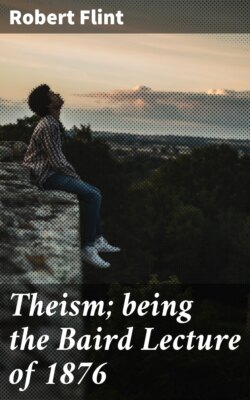Theism; being the Baird Lecture of 1876

Реклама. ООО «ЛитРес», ИНН: 7719571260.
Оглавление
Flint Robert. Theism; being the Baird Lecture of 1876
Theism; being the Baird Lecture of 1876
Table of Contents
THEISM
LECTURE I
LECTURE II
LECTURE III
LECTURE IV
LECTURE V
LECTURE VI
LECTURE VII
LECTURE VIII
LECTURE IX
LECTURE X
APPENDIX
FOOTNOTES:
Отрывок из книги
Robert Flint
Published by Good Press, 2019
.....
The greatest issues, then, are involved in the investigation on which we enter. Can we think what these are, or reflect on their greatness, without drawing this inference, that we ought, in conducting it, to have no other end before us than that of seeking, accepting, and communicating the truth? This is here so important that everything beside it must be insignificant and unworthy. Any polemical triumphs which could be gained either by logical or rhetorical artifices would be unspeakably paltry. Nothing can be appropriate in so serious a discussion but to state as accurately as we can the reasons for our own belief in theism, and to examine as carefully and impartially as we can the objections of those who reject that belief, and their reasons for holding an opposite belief. It can only do us harm to overrate the worth of our own convictions and arguments, or to underrate the worth of those of others. We must not dare to carry into the discussion the spirit of men who feel that they have a case to advocate at all hazards. We must not try to conceal a weakness in our argumentation by saying hard things of those who endeavour to point it out. There is no doubt that character has an influence on creed—that the state of a man's feelings determines to a considerable extent the nature of his beliefs—that badness of heart is often the cause of perversity of judgment; but we have no right to begin any argument by assuming that this truth has its bright side—its side of promise—turned towards us, and its dark and threatening side turned towards those who differ from us. If we can begin by assuming our opponents to be wicked, why should we not assume them at once to be wrong, and so spare ourselves the trouble of arguing with them? It will be better to begin by assuming only what no one will question—namely, that it is a duty to do to others as we would have others do to us. When a man errs, it is a kindness to show him his error—and the greater the error, the greater the kindness; but error is so much its own punishment to every ingenuous nature, that to convince a person of it is all that one fallible person ought to do to another. The scoff and the sneer are out of place in all serious discussion; especially are they out of place when our minds are occupied with thoughts of Him who, if He exist, is the Father and Judge of us all, who alone possesses the full truth, and who has made us that we might love one another.[4]
Theism is the doctrine that the universe owes its existence, and continuance in existence, to the reason and will of a self-existent Being, who is infinitely powerful, wise, and good. It is the doctrine that nature has a Creator and Preserver, the nations a Governor, men a heavenly Father and Judge. It is a doctrine which has a long history behind it, and it is desirable that we should understand how we are related to that history.
.....